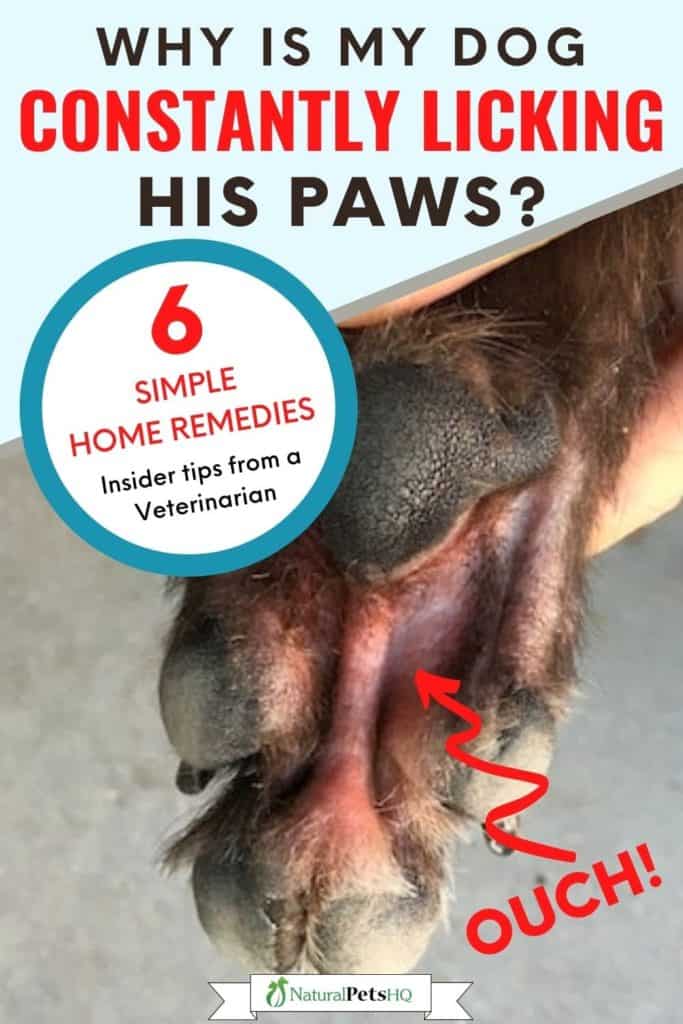Is your dog excessively licking and chewing their paws, even when you try to distract them? This common behavior can stem from a variety of issues, ranging from simple cleanliness to more serious underlying medical conditions. Understanding the potential causes is the first step in providing your canine companion with the relief they need.
5 Reasons Your Dog Is Licking Their Paws
While dogs may lick their paws occasionally for self-soothing, cleaning, or exploration after a walk, excessive licking and chewing that leads to self-harm warrants a closer look. It’s crucial to consult with your veterinarian to accurately diagnose and promptly treat the underlying cause.
Here are some of the most common reasons for excessive paw licking and chewing:
1. Injuries or General Pain
Aggressive paw licking or chewing can signal pain or injury. Other signs might include limping, avoiding stairs, or a general decrease in activity. Potential causes of paw pain include:
- Cuts and scrapes: Paw pads can be easily injured by rough surfaces, sharp objects, or even extreme temperatures.
- Foreign objects: Thorns, glass shards, or small rocks can become embedded in the paw.
- Insect stings or bites: A sting or bite can cause localized pain, swelling, and irritation. Dr. Valentina Henao, a veterinarian, advises checking for embedded stingers that could trigger allergic reactions.
- Broken bones or sprains: More severe injuries can cause significant pain and discomfort.
If you suspect an injury, it’s important to have your veterinarian examine your dog for a proper diagnosis and treatment plan.
2. Allergies
Allergies are a frequent culprit behind itchy skin and paws in dogs, often leading to secondary issues like hot spots and ear infections. Allergens can be environmental (pollen, dust mites, mold) or food-related. Identifying the specific allergen can be a complex process.
Dr. Henao explains that treatment typically involves a multi-faceted approach, which may include:
- Allergy medications: Antihistamines, corticosteroids, or newer injectable medications like Cytopoint can help manage allergic reactions.
- Topical treatments: Medicated shampoos and conditioners can soothe irritated skin and treat infections.
- Dietary changes: For food allergies or intolerances, a limited ingredient diet or a veterinary-prescribed diet with novel or hydrolyzed proteins may be recommended. Brands like Blue Buffalo Basics offer specialized formulas.
- Flea and tick prevention: For flea allergies, consistent preventative medication is key.
3. Fleas and Ticks
Fleas and ticks are common external parasites that can cause intense itching and discomfort, leading dogs to excessively lick and bite at their skin, particularly their paws. These pests are prevalent in environments like bedding, carpets, yards, and wooded areas.
Identifying an infestation involves a physical check:
- Fleas: Look for small, fast-moving insects on the skin and dark specks (flea dirt) in the fur.
- Ticks: Check between the toes, in ear canals, and under the legs. Prompt and proper removal with tweezers or a tick spoon is essential to prevent infection.
Preventing and treating flea and tick infestations is straightforward with veterinary-recommended preventative medications, available in various forms such as topical treatments, oral chews, and collars.
4. Arthritis
Arthritis, a degenerative joint condition, commonly affects older dogs and can impact their paws and toes. The breakdown of joint cartilage leads to pain, inflammation, and reduced mobility. While it affects major joints, the toes can also be a source of discomfort.
Management strategies for arthritis include:
- Low-impact exercise and physical therapy: Gentle movement helps maintain joint flexibility and can alleviate pain.
- Pain and anti-inflammatory medications: Your veterinarian may prescribe NSAIDs or other pain relievers to manage discomfort.
- Weight management: Maintaining a healthy weight reduces stress on the joints.
- Supplements: Glucosamine and chondroitin supplements may support joint health.
5. Behavioral Issues
Sometimes, even after medical causes are ruled out, paw licking and chewing can persist due to behavioral or psychological reasons. These can include:
- Anxiety and stress: Changes in routine, separation anxiety, or new environmental stressors can manifest as compulsive licking.
- Obsessive-compulsive disorder (OCD): In some cases, paw licking can become a compulsive behavior that requires intervention.
- Boredom: Lack of sufficient mental and physical stimulation can lead to dogs finding ways to occupy themselves, such as excessive licking.
Addressing behavioral issues may involve working with a veterinarian or a veterinary behaviorist to develop a plan that might include environmental enrichment, increased exercise, training, and sometimes medication.
Working With Your Veterinarian To Treat the Issue
While paw licking isn’t typically an emergency, prompt veterinary attention is advised if your dog exhibits any of the following signs:
- Bleeding from the paws
- Swollen paws
- Limping
- Pus or discharge, indicating infection
- Vocalization (whimpering, crying) or wincing when paws are touched
Dr. Henao emphasizes that untreated paw licking can escalate into more severe problems like bacterial infections of the paws, known as pododermatitis. This painful condition can become difficult to treat if not addressed early. Collaborating with your veterinarian ensures that the root cause is identified and managed effectively, leading to a simpler and more successful resolution. Early detection and intervention are key to resolving paw licking and chewing issues and maintaining your dog’s overall well-being. Remember, if your dog is exhibiting concerning behaviors like paw chewing, it is always best to seek professional veterinary advice to ensure your pet receives the appropriate care.

